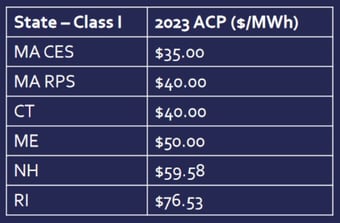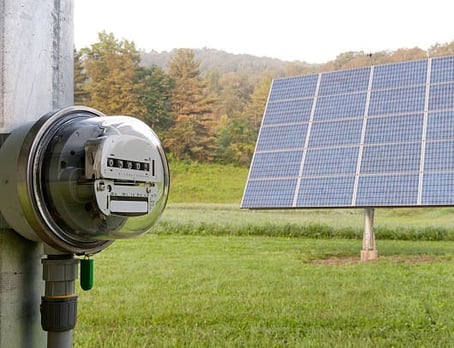Massachusetts' Electric Car Rebate is Winding Down
Earlier this week, officials from the Baker administration announced plans to extend Massachusetts Offers Rebates...
This month, the Mass. Department of Environmental Protection (DEP) is taking comments on a discussion document about potential new rules to strengthen the Mass. Clean Energy Standard (CES), which sets a minimum percentage of electricity sales that must come from new clean energy sources. According to the discussion document, DEP is considering these changes to align the CES with the greenhouse gas reduction requirements of the Clean Energy and Climate Plan and specific emission sublimit for the electricity sector. Green Energy Consumers has reviewed the discussion document, is very pleased by the proposed changes, and encourages citizens to express support.
CES Changes We Love: There are two suggested policy options in the discussion document that we feel are particularly important and welcome.
 Under the current rule, if a supplier does not meet its obligation to include the specified percentage of clean energy in its portfolio for a given year, it can make an Alternative Compliance Payment (ACP). Dollars paid to the Commonwealth via the ACP are used to support new clean energy projects. Under former Governor Baker, the Mass. ACP was reduced to the lowest in our region.
Under the current rule, if a supplier does not meet its obligation to include the specified percentage of clean energy in its portfolio for a given year, it can make an Alternative Compliance Payment (ACP). Dollars paid to the Commonwealth via the ACP are used to support new clean energy projects. Under former Governor Baker, the Mass. ACP was reduced to the lowest in our region.
There are two consequences of this. First, suppliers in the other New England states have a greater incentive to procure clean energy resources. Second, to the extent that alternative compliance payments are made, Massachusetts could be generating more income for clean energy projects.
The above chart shows the ACP for clean energy standards in the states across our region.
 Under current rules, the CES percentage each year is based on how much electricity is sold by National Grid, Eversource, or Unitil, rather than how much electricity is consumed. When an electricity customer puts solar on their property and net meters, the amount of electricity bought by the customer from the utility is reduced by the amount of solar they generate. This type of generation is called Behind-the-Meter and contrasts with the generation that goes directly into the grid. Therefore, for every megawatt hour of solar generated behind-the-meter, there is less than one megawatt-hour of solar contributing to the CES. DEP is suggesting that the CES be set higher to account for behind-the-meter generation. This would be an excellent improvement in the accounting process and raising the CES in such a way would significantly reduce emissions from the electricity. If adopted this year, it would increase the CES by about five percent (5%).
Under current rules, the CES percentage each year is based on how much electricity is sold by National Grid, Eversource, or Unitil, rather than how much electricity is consumed. When an electricity customer puts solar on their property and net meters, the amount of electricity bought by the customer from the utility is reduced by the amount of solar they generate. This type of generation is called Behind-the-Meter and contrasts with the generation that goes directly into the grid. Therefore, for every megawatt hour of solar generated behind-the-meter, there is less than one megawatt-hour of solar contributing to the CES. DEP is suggesting that the CES be set higher to account for behind-the-meter generation. This would be an excellent improvement in the accounting process and raising the CES in such a way would significantly reduce emissions from the electricity. If adopted this year, it would increase the CES by about five percent (5%).
Just Transition Fee
DEP is considering the establishment of a Just Transition Fee that would be financed by a fee on transactions involving resources that qualify for the CES. Money from these fees would support the siting of CES projects in ways that improve social equity, such as low-income solar. We love half that idea, creating a Just Transition Fee. But in our view, the Just Transition Fee should be placed on fossil fuel generation rather than clean energy. In fact, Massachusetts and other states in the Northeast are currently reviewing options to make the Regional Greenhouse Gas Initiative stronger in this respect.
Adding a Timing Component to the Standard
Currently, the CES is met by clean energy generation regardless of when it is produced. DEP is considering the exclusion of clean energy generation during periods when demand is low and wholesale electricity prices are negative. We see two issues with this idea. First, it fails to recognize that as electric vehicle and stationary storage adoption increases in the Commonwealth, it would be beneficial to encourage owners of EVs and storage to charge up during those periods of low demand and low wholesale prices to balance out the grid. Second, adding a time element to the standard would be very difficult to implement and oversee. Quite frankly, the topic of managing clean energy supply and demand is a major aspect of grid modernization that needs to be addressed by several state agencies, including DEP, but also the Department of Energy Resources, and the Department of Public Utilities.

MassDEP requests comments on the discussion document by January 19th, 2024, and will hold virtual stakeholder meetings on January 11th at 11:00 AM and 5:00 PM (advance registration required). Register for the 11:00 AM meeting here. Register for the 5:00 PM meeting here. The DEP discussion document is four pages long and touches on some other potential changes beyond those referenced above that may be of interest to you. You can find information on the CES and the discussion document here.
Earlier this week, officials from the Baker administration announced plans to extend Massachusetts Offers Rebates...
When it comes to combatting climate change, energy efficiency is our first line of defense. It is an abundant,...
Comments